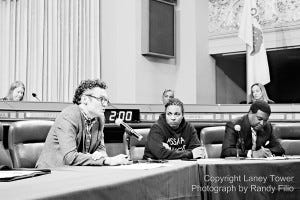Black, brown relations with police get hearing
 Hundreds of Oakland residents and community organizers gathered with elected officials on Jan. 24. at Oakland City Hall for a town hall meeting to discuss relations between black and brown communities and local law enforcement.
Hundreds of Oakland residents and community organizers gathered with elected officials on Jan. 24. at Oakland City Hall for a town hall meeting to discuss relations between black and brown communities and local law enforcement.
Concerned about the racialized history of police brutality in Oakland, the group arrived well before the meeting was set to begin, filling the floor and gallery seating and lining the walls of the chamber room.
This meeting was precipitated by the wave of recent protests following the no indictment decisions in two fatal police officer killings of unarmed black men.
Jazz Hudson, a member of Youth Speaks, began the meeting by reading a poem describing the relationship between institutional racism and the disproportionate numbers of black and brown people killed by police.
Listing the names of those lost to police violence, she encouraged the public to participate by adding to the list. Each name was followed by “Ashe,” a Yoruba word that means “so be it.”
During opening remarks, Rep. Barbara Lee voiced her support for the Black Lives Matter movement, stating that she was saddened to be having the same conversations with her grandsons about racism and police brutality that she had with her sons years ago, declaring that it is now “time for change.” She also expressed pride that “Oakland leads the country on these issues.”
Other remarks were made by Jonathan Maligon of the Policy Link Alliance, Pastor Mike O’Brien of Oakland, and Shelia Pope of the Black Power Network.
Members of the Black Friday 14, a group of demonstrators who were arrested on Black Friday for chaining themselves to a BART platform to protest the non-indictment of Ferguson, Mo., police officer Darren Wilson in the Michael Brown case, demanded that BART drop the $70,000 it had charged against the protesters in restitution.
BART director Robert Raburn responded that he could not make that promise, which was met by “boos” from the public and a group of individuals who began singing “Which side are you on, friends?”
Emotions ran high as each community leader and advocate on the panel presented various issues of concern. These ranged from the historical lack of trust between law enforcement and communities of
color, slow police response times in communities of color, lack of police accountability and the need for reinvestment in jobs and housing in Oakland. Activists also connected police violence to the increasing gentrification of the city.
Community organizers and other members of the public proposed multiple strategies for improvement. These included the creation of a community-run accountability task force for officers, having
police officers wear cameras at all times, policy changes to eliminate racial profiling and paid leave for officers involved in such cases.
“We have to be careful not to be a historical here. The stories have added up, the trust has been broken,” Pastor O’Brien said.
Oakland Police Chief Sean Whent admitted that Oakland Police Department (OPD) has had “strained relationships with communities of color” caused by poor tactics, policies and training, but
assured the public that the OPD of today is not the same as the OPD of the past, as significant changes have been made in recent years.
After the panelists spoke, the floor opened up for a select number of questions and comments from the public. A second panel then discussed the relationship between policing and the school-to-prison pipeline.
According to panelists and community members, much work needs to be done to repair and restore relations between police and communities of color.
Pointing to the more than 76 peaceful demonstrations that took place in the Bay Area over the Martin Luther King weekend, Black Power Network member Sheila Pope noted that despite efforts
to minimize demonstrations, the Black Lives Matter movement has picked up steam and shows no sign of quieting down soon.

























